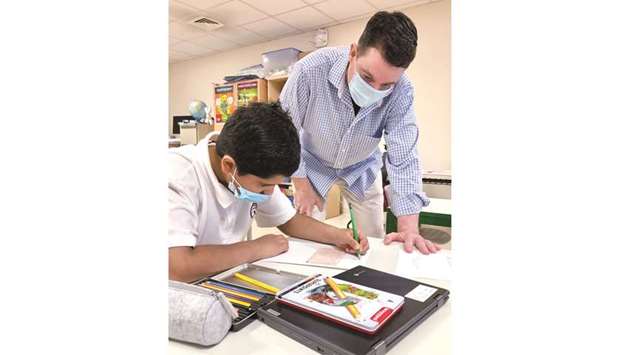A Qatar Foundation (QF) academic is using a different path to foster creativity in the learning process of the students by making use of cartoons in the classrooms.
Marc Deragon, a teacher at Qatar Academy Sidra, part of QF’s Pre-University Education is able to inspire students by bringing some of the most cherished cartoon characters to classrooms during breaks between classes.
“Animated characters, especially the ones from Disney, have become a part of children’s daily lives. Watching cartoons regularly has effects not only on the socio-emotional development of children, but also on their daily behaviour, perspective of life, relationships with others, and understanding of what is good and bad. Therefore, I thought it would be a good idea to bring this imaginary world to my classrooms,” he explained.
Deragon believes that it could be more interesting for children by having their favourite cartoons as part of their studies at school – cartoons that spark discussions with their friends at school – opening up opportunities for creative and critical thinking.
“Students are given a list of family movies to select from and vote to watch. In the past few years, we’ve watched several movies, such as A Bug's Life, The Incredibles and Brave; while this year we watched The Lion King, Inside Out, among others,” he said.
The teacher feels that dedicating 10 minutes to animated movies during class breaks has a direct benefit on children which is an enjoyable experience that creates a productive learning environment.
According to Deragon, after watching an animated movie, children start writing down their notes and reviewing different aspects of the movie in depth. They explore what there is to learn about life, and about teamwork, tolerance, friendship, and other meaningful attributes that cartoons usually teach.
“Enhancing skills of critical thinking and questioning is a key objective of this activity. We always discuss how the story has unfolded, and ask students thought-provoking questions like ‘how do you perceive the characters, how would you react in that specific situation’?” he remarked.
“Sometimes, we give students a written exercise to explore different and important concepts, including decision-making, change, responsibility, etc. We ask them questions such as, why did Simba of The Lion King change his mind and return home? To what extent were decisions of Riley from Inside Out influenced by the feelings of fairness and happiness?” he, described.
Deragon maintains that watching animated video clips during class breaks is an effective way to attract students and encourage them to reflect on what they see on the screen and in the media, and how to respond to human issues. It is a way that has proved fruitful and more engaging than lecturing on positive values, such as empathy or friendship.
“This activity enables children to criticise the movie and come up with new dialogues and different endings. It also inspires them to create their own stories. Ultimately, it enhances their critical thinking so that they can distinguish right from wrong and make the right choice,” added the academic.
Marc Deragon, a teacher at Qatar Academy Sidra, part of QF’s Pre-University Education is able to inspire students by bringing some of the most cherished cartoon characters to classrooms during breaks between classes.
“Animated characters, especially the ones from Disney, have become a part of children’s daily lives. Watching cartoons regularly has effects not only on the socio-emotional development of children, but also on their daily behaviour, perspective of life, relationships with others, and understanding of what is good and bad. Therefore, I thought it would be a good idea to bring this imaginary world to my classrooms,” he explained.
Deragon believes that it could be more interesting for children by having their favourite cartoons as part of their studies at school – cartoons that spark discussions with their friends at school – opening up opportunities for creative and critical thinking.
“Students are given a list of family movies to select from and vote to watch. In the past few years, we’ve watched several movies, such as A Bug's Life, The Incredibles and Brave; while this year we watched The Lion King, Inside Out, among others,” he said.
The teacher feels that dedicating 10 minutes to animated movies during class breaks has a direct benefit on children which is an enjoyable experience that creates a productive learning environment.
According to Deragon, after watching an animated movie, children start writing down their notes and reviewing different aspects of the movie in depth. They explore what there is to learn about life, and about teamwork, tolerance, friendship, and other meaningful attributes that cartoons usually teach.
“Enhancing skills of critical thinking and questioning is a key objective of this activity. We always discuss how the story has unfolded, and ask students thought-provoking questions like ‘how do you perceive the characters, how would you react in that specific situation’?” he remarked.
“Sometimes, we give students a written exercise to explore different and important concepts, including decision-making, change, responsibility, etc. We ask them questions such as, why did Simba of The Lion King change his mind and return home? To what extent were decisions of Riley from Inside Out influenced by the feelings of fairness and happiness?” he, described.
Deragon maintains that watching animated video clips during class breaks is an effective way to attract students and encourage them to reflect on what they see on the screen and in the media, and how to respond to human issues. It is a way that has proved fruitful and more engaging than lecturing on positive values, such as empathy or friendship.
“This activity enables children to criticise the movie and come up with new dialogues and different endings. It also inspires them to create their own stories. Ultimately, it enhances their critical thinking so that they can distinguish right from wrong and make the right choice,” added the academic.


